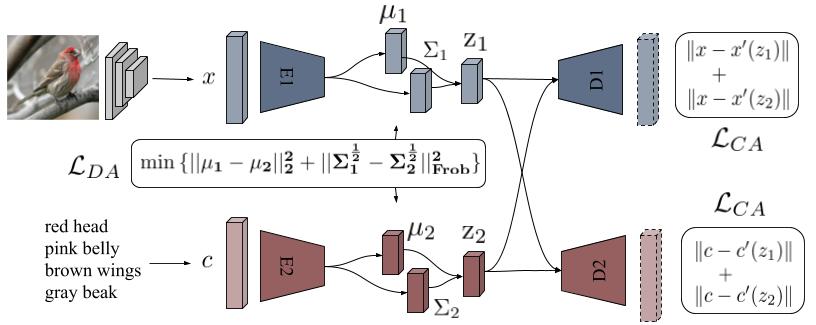Tensorflow Mnist CvaeTensorflow implementation of conditional variational auto-encoder for MNIST
Stars: ✭ 139 (-29.8%)
Mutual labels: vae, variational-autoencoder
Pytorch VaeA CNN Variational Autoencoder (CNN-VAE) implemented in PyTorch
Stars: ✭ 181 (-8.59%)
Mutual labels: vae, variational-autoencoder
Variational AutoencoderVariational autoencoder implemented in tensorflow and pytorch (including inverse autoregressive flow)
Stars: ✭ 807 (+307.58%)
Mutual labels: vae, variational-autoencoder
Disentangling VaeExperiments for understanding disentanglement in VAE latent representations
Stars: ✭ 398 (+101.01%)
Mutual labels: vae, variational-autoencoder
MojitalkCode for "MojiTalk: Generating Emotional Responses at Scale" https://arxiv.org/abs/1711.04090
Stars: ✭ 107 (-45.96%)
Mutual labels: vae, variational-autoencoder
Awesome VaesA curated list of awesome work on VAEs, disentanglement, representation learning, and generative models.
Stars: ✭ 418 (+111.11%)
Mutual labels: vae, variational-autoencoder
Vae protein functionProtein function prediction using a variational autoencoder
Stars: ✭ 57 (-71.21%)
Mutual labels: vae, variational-autoencoder
classifying-vae-lstmmusic generation with a classifying variational autoencoder (VAE) and LSTM
Stars: ✭ 27 (-86.36%)
Mutual labels: vae, variational-autoencoder
SmrtHandle class imbalance intelligently by using variational auto-encoders to generate synthetic observations of your minority class.
Stars: ✭ 102 (-48.48%)
Mutual labels: vae, variational-autoencoder
Python World Stars: ✭ 98 (-50.51%)
Mutual labels: vae, variational-autoencoder
Pytorch RlThis repository contains model-free deep reinforcement learning algorithms implemented in Pytorch
Stars: ✭ 394 (+98.99%)
Mutual labels: vae, variational-autoencoder
Deep Learning With PythonExample projects I completed to understand Deep Learning techniques with Tensorflow. Please note that I do no longer maintain this repository.
Stars: ✭ 134 (-32.32%)
Mutual labels: vae, variational-autoencoder
Tensorflow Mnist VaeTensorflow implementation of variational auto-encoder for MNIST
Stars: ✭ 422 (+113.13%)
Mutual labels: vae, variational-autoencoder
S Vae PytorchPytorch implementation of Hyperspherical Variational Auto-Encoders
Stars: ✭ 255 (+28.79%)
Mutual labels: vae, variational-autoencoder
Variational AutoencoderPyTorch implementation of "Auto-Encoding Variational Bayes"
Stars: ✭ 25 (-87.37%)
Mutual labels: vae, variational-autoencoder
VAE-Gumbel-SoftmaxAn implementation of a Variational-Autoencoder using the Gumbel-Softmax reparametrization trick in TensorFlow (tested on r1.5 CPU and GPU) in ICLR 2017.
Stars: ✭ 66 (-66.67%)
Mutual labels: vae, variational-autoencoder
srVAEVAE with RealNVP prior and Super-Resolution VAE in PyTorch. Code release for https://arxiv.org/abs/2006.05218.
Stars: ✭ 56 (-71.72%)
Mutual labels: vae, variational-autoencoder
Vae For Image GenerationImplemented Variational Autoencoder generative model in Keras for image generation and its latent space visualization on MNIST and CIFAR10 datasets
Stars: ✭ 87 (-56.06%)
Mutual labels: vae, variational-autoencoder
Vae TensorflowA Tensorflow implementation of a Variational Autoencoder for the deep learning course at the University of Southern California (USC).
Stars: ✭ 117 (-40.91%)
Mutual labels: vae, variational-autoencoder

